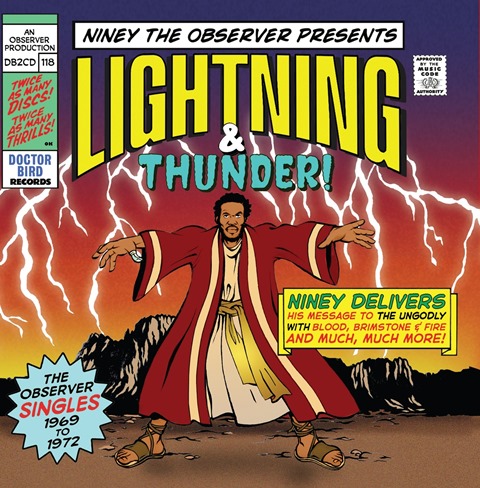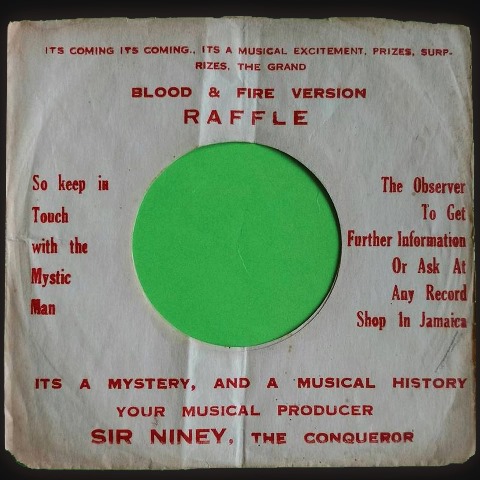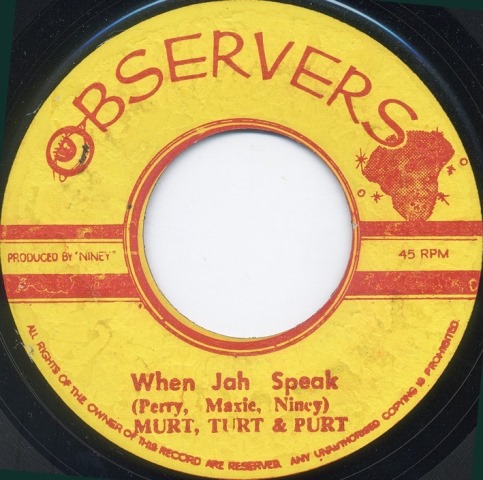Winston Holness started his own record label in 1969. Missing a finger, he became known by many folks as Niney. Born 7 December 1944, he had lost a thumb in an accident at work. By the point his imprint debuted, he had sung on a Clement “Coxsone” Dodd-produced track and was working as a salesman for other producers, including Clancy Eccles, Bunny “Striker” Lee and Lee “Scratch” Perry.
Niney would get on a bike and take records to dances where he tried to get DJs to play them. He was also shadowing Bunny Lee in the recording studio, picking up on how records were produced. He began co-producing with Joel Gibson, who traded as Joe Gibbs. In 1969, Niney was embedded in Jamaica’s music business – an all-rounder, he could do anything he turned his hand to. That Coxsone track he first sang on, "You Shouldn’t Be The One,” was released in 1968. Niney was moving fast.
 He named his new label Destroyer. That was too much for the proprietorial Lee Perry, who decided it was too close to the name of his own label – and persona – Upsetter. In the booklet coming with Niney The Observer Presents Lightning And Thunder!, Niney is quoted as saying “I did name Destroyer before. When I decide to start out on my own, I remember Lee Perry come down and said to me ‘I am The Upsetter so you can’t destroy me…’ Gradually I go to the artwork guy and said I want to change my label…name it Observer.” Clearly, Lee Perry was not to be ignored.
He named his new label Destroyer. That was too much for the proprietorial Lee Perry, who decided it was too close to the name of his own label – and persona – Upsetter. In the booklet coming with Niney The Observer Presents Lightning And Thunder!, Niney is quoted as saying “I did name Destroyer before. When I decide to start out on my own, I remember Lee Perry come down and said to me ‘I am The Upsetter so you can’t destroy me…’ Gradually I go to the artwork guy and said I want to change my label…name it Observer.” Clearly, Lee Perry was not to be ignored.
The Observer label (also known as Observers) debuted in 1970, and Niney duly became Niney The Observer. The next year, late 1970’s “Blood & Fire” single – credited to The Observer – was a massive seller. The label’s hyperbole-laden sleeves (pictured below left) declared “It’s a mystery, and a musical history. Your musical producer, Sir Niney, The Conqueror.”
 Niney The Observer Presents Lightning And Thunder! is a 47-track double-CD overview of the early years of the man born Winston Holness. The years 1969 to 1972 are covered. It kicks off with Destroyer label tracks, but the bulk of what’s heard was issued by Observer/Observers. There are cuts by Jamaican musical mainstays Dennis Alcapone, Tommy McCook and Max Romeo, along with tracks credited to Max Romeo & Niney and Niney & The Heptones. Niney was working with top-drawer acts. “When Jah Speaks,” a 1972 single credited to the fantastically named Murt, Turt & Purt, is a collaboration between Niney, Max Romeo and Lee Perry (who, presumably, had got off his high horse and was no longer grumpy about Niney).
Niney The Observer Presents Lightning And Thunder! is a 47-track double-CD overview of the early years of the man born Winston Holness. The years 1969 to 1972 are covered. It kicks off with Destroyer label tracks, but the bulk of what’s heard was issued by Observer/Observers. There are cuts by Jamaican musical mainstays Dennis Alcapone, Tommy McCook and Max Romeo, along with tracks credited to Max Romeo & Niney and Niney & The Heptones. Niney was working with top-drawer acts. “When Jah Speaks,” a 1972 single credited to the fantastically named Murt, Turt & Purt, is a collaboration between Niney, Max Romeo and Lee Perry (who, presumably, had got off his high horse and was no longer grumpy about Niney).
As Lightning And Thunder! is sequenced chronologically, it’s an opportunity to hear the development of Niney’s music and the recording techniques he employed. The earliest tracks are are in a loose rocksteady style. “Music Police” (1970, credited to The Sound Dimension) has an “Al Capone”-slanted voice and sound-effects intro, and features further smatterings of gunshot noises. Leroy “Horsemouth” Wallace’s “Skankey” (also 1970: he was later in the film Rockers) is a DJ-styled exhortation to, it seems, dance. A change comes with another 1970 cut, Lloyd Willis’s “Apollo Rocket,” where a reggae undertone is emerging, along with dub touches to the guitar. Using everything he had learned in his two years in the music business, Niney was exploring different methods of completing tracks.
 From hereon in, Niney shows he was also willing to draw from local and other influences. Dennis Alcapone’s “You Must Believe Me” (1971) is a cover of an Impressions song evoking The Maytals. While the records could be this straightforward, there are also more idiosyncratic tracks: “Observing The Ave.” (1971, credited to Niney) is a strident toast with an unusually minimal backing track, also used for an instrumental deconstruction of Sly and the Family Stone’s “Everyday People” which is barely recognisable as a cover version.
From hereon in, Niney shows he was also willing to draw from local and other influences. Dennis Alcapone’s “You Must Believe Me” (1971) is a cover of an Impressions song evoking The Maytals. While the records could be this straightforward, there are also more idiosyncratic tracks: “Observing The Ave.” (1971, credited to Niney) is a strident toast with an unusually minimal backing track, also used for an instrumental deconstruction of Sly and the Family Stone’s “Everyday People” which is barely recognisable as a cover version.
When definitively reggae territory is entered in 1972, accessibility does not necessarily mean that individualism has been abandoned. Sections of “Aily & Ailaloo,” credited to Niney & Max Romeo, are fashioned as portentous public service announcements extolling the benefits of herb. “Another Pum,” a dub version of “Big Hole” credited to The Observers, is so pared down it, at points, barely exists. The backing track of “Beg in the Gutter" (as by Niney & The Observers) is staccato, lacking reggae’s characteristic openness. Lightning And Thunder! ends with “Forward Pipe” (also 1972, credited to Niney & Ken Elliott), a skanking instrumental dominated by a blooping, gurgling synth. Niney wasn’t sticking with templates.
After 1972, Niney ploughed on, had spells living in France and New York City, between which he came back to Jamaica. He returned there full time in 1988. Always at the centre of the Jamaican music business, he recognised the importance of his catalogue and has had an active role in reissue collections. However, much of what’s on Niney The Observer Presents Lightning And Thunder! had been out of reach; 22 of its tracks have never been on CD before. And despite the appearance of the word "presents" in the title, Niney is not involved. But it’s a fair bet he will be very happy with this double CD.
- Next week: Status Quo - The Early Years (1966-69). Five CDs from before denim and boogie became the default
- More reissue reviews on theartsdesk
- Kieron Tyler’s website















Add comment